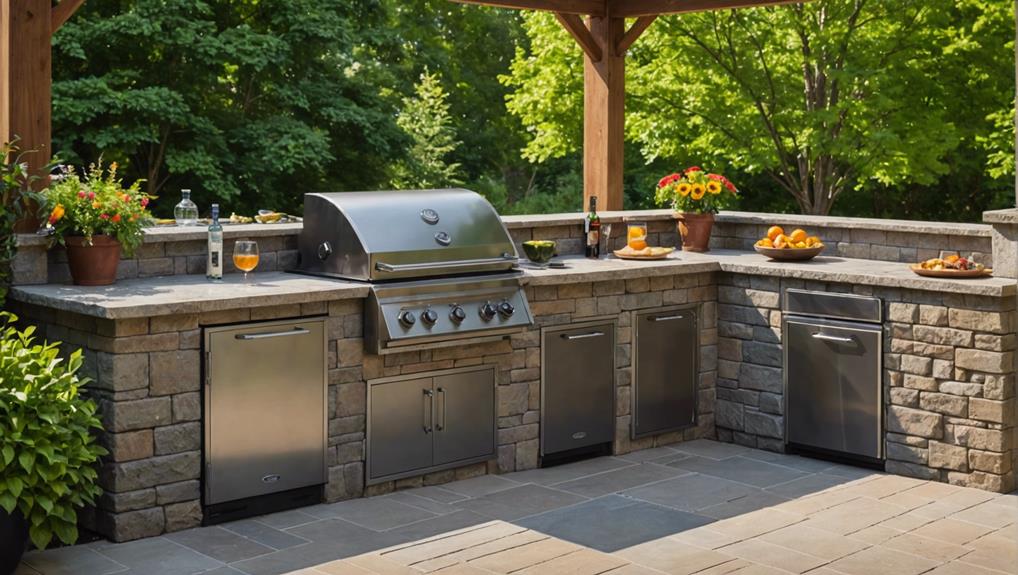
Choosing the Best Countertops for Your Outdoor Kitchen
When picking the best countertops for your outdoor kitchen, focus on materials that balance beauty and resilience. Granite, with its natural look and excellent durability, tops the list as it withstands sun and rain superbly. Concrete offers great customization though it needs regular care to avoid stains. Quartz presents a sleek look but fades under prolonged sun exposure, so it's less advisable. Always consider the specific environmental conditions your kitchen will face. Opt for non-porous materials, and guarantee proper sealing to enhance weather resistance. This groundwork paves the way for a kitchen that's both functional and stunning, with more insights just ahead.
Key Takeaways
- Opt for durable materials like granite or quartzite that withstand weather extremes.
- Consider non-porous countertops like stainless steel for easy cleaning and hygiene.
- Balance your budget by comparing upfront costs with long-term maintenance expenses.
- Ensure the material complements your outdoor aesthetic and fits within the space design.
- Choose countertops that require minimal upkeep, such as those needing less frequent sealing.
Understanding Outdoor Countertops
When selecting countertops for your outdoor kitchen, it's essential to choose materials that not only withstand the elements but also complement your outdoor aesthetic. You've got a range of options, each with unique benefits and style implications. Let's explore some material comparisons and current design trends to help you make an informed decision.
Granite, for instance, is a popular choice due to its natural look and unique patterns that enhance any outdoor space. It blends beautifully with natural surroundings and is available in various hues to match your design scheme.
Concrete countertops, on the other hand, offer a modern, minimalist vibe and can be customized with different colors and textures. If you're leaning towards a contemporary outdoor kitchen, concrete could be your go-to.
Quartz is another top contender, known for its sleek appearance and extensive color options, aligning well with modern design trends. However, unlike granite and concrete, quartz may not fare as well in direct sunlight over time, so consider your kitchen's exposure to the elements.
Each material brings something special to the table, so weigh these options against your aesthetic preferences and the theme of your outdoor area. This way, you'll make sure your countertops aren't just durable but are also a focal point of your outdoor kitchen's design.
Evaluating Countertop Durability
When selecting countertops for your outdoor kitchen, you'll want to think about how well they can handle the weather. Materials like granite offer excellent resistance to sun and rain, ensuring your space looks great year after year.
However, it's also important to think about maintenance; some options require more care to prevent stains and scratches.
Weather Resistance Factors
To guarantee your outdoor kitchen withstands the elements, choose countertops like granite that offer superior durability and weather resistance. Granite is non-porous and can handle rain, heat, and frost without showing wear.
This makes it ideal for outdoor exposure where other materials might falter. For instance, quartz, while popular indoors, tends to discolor under direct sunlight, reducing its material suitability for outdoor settings.
Concrete, although robust, absorbs stains and scratches more readily, which could compromise its appearance and functionality over time.
Glass countertops, despite their sleek look, are too fragile for the rough-and-tumble of outdoor use. When selecting a countertop, prioritize materials that pair aesthetic appeal with proven resilience to environmental challenges.
Maintenance and Care Requirements
You'll need to take into account not only the durability but also the maintenance and care each type of countertop requires before making your choice for an outdoor kitchen. Granite, for instance, is a champ regarding durability and is easy to maintain with basic cleaning techniques. However, it might need periodic sealing to maintain its sheen. Quartz, while resilient against stains, can fade under constant sun, so consider its placement.
| Material | Cleaning Ease | Sealing Needed |
|---|---|---|
| Granite | Easy | Periodically |
| Quartz | Easy | Rarely |
| Concrete | Moderate | Yes |
Choose wisely, focusing not just on aesthetics but also on how much effort you're willing to put into upkeep.
Weather Resistance Features
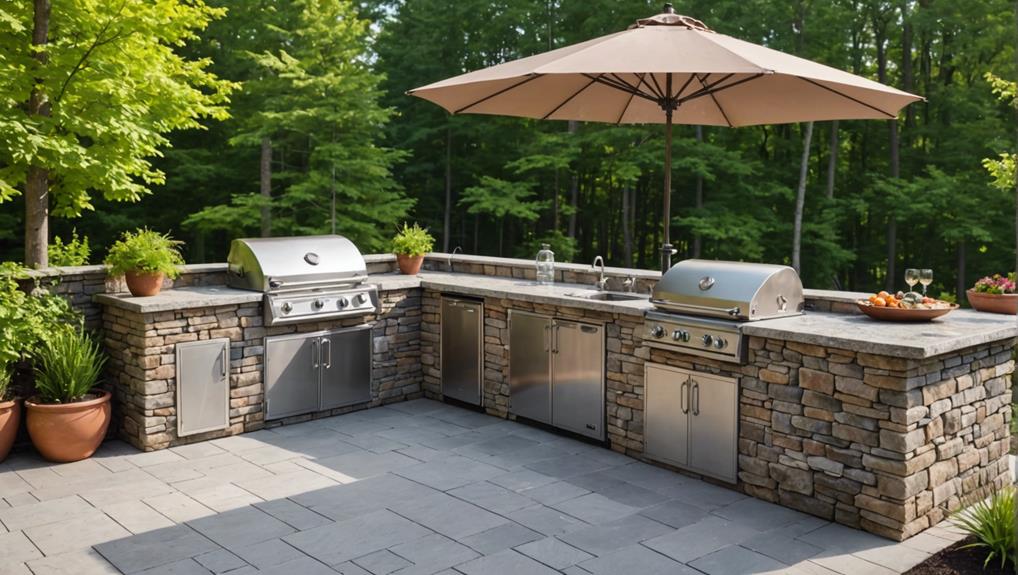
Selecting countertops with strong weather resistance features is essential for your outdoor kitchen's longevity and aesthetic appeal. When it comes to material selection, you'll want to opt for options like granite, quartzite, or stainless steel. These materials not only offer superior durability but also stand up well against UV rays and are less likely to fade or degrade under constant exposure to the sun. Their inherent strength ensures they can handle the harshness of rain, wind, and fluctuating temperatures without cracking or warping.
Incorporating weatherproofing techniques is also vital. Choosing non-porous materials is a smart move as they prevent water absorption, which can cause serious damage in the form of cracking or splitting in colder climates. Additionally, make sure that your chosen material is properly sealed. This extra layer of protection helps in repelling moisture and maintaining the surface integrity over time.
Consider the specific environmental conditions of your area. If your outdoor kitchen is in a region with extreme weather, you'll need countertops that can withstand those particular challenges without frequent repairs or replacements. This strategic approach not only saves you money in the long run but also keeps your outdoor space looking great.
Maintenance and Care Tips
Maintaining your outdoor kitchen's countertops requires regular care to preserve their beauty and functionality. For natural stone surfaces like granite, employing sealing techniques annually will shield them from the elements and enhance their longevity benefits. This simple step guarantees they remain impervious to stains and weather-induced wear.
For daily upkeep, opt for gentle soap solutions. Quartzite counters, for instance, thrive with just a mild soap and water mixture, preventing stains while maintaining their pristine condition over time. This approach not only keeps them looking great but also extends their usability in your outdoor space.
Remember, some materials need specific care. Avoid placing hot items directly on concrete countertops to dodge unsightly marks or potential cracks. Instead, use trivets or heat pads to protect the surface. If you're working with wood, regular application of a food-safe oil is essential. This routine not only deepens the wood's rich tones but also fortifies it against the changing outdoor conditions.
To tackle any accidental spills or stubborn stains on porcelain surfaces, a non-abrasive cleaner is your best bet. This will effectively remove blemishes without harming the countertop's glossy finish or vibrant color, ensuring your outdoor kitchen remains a highlight of your home.
Budget Considerations
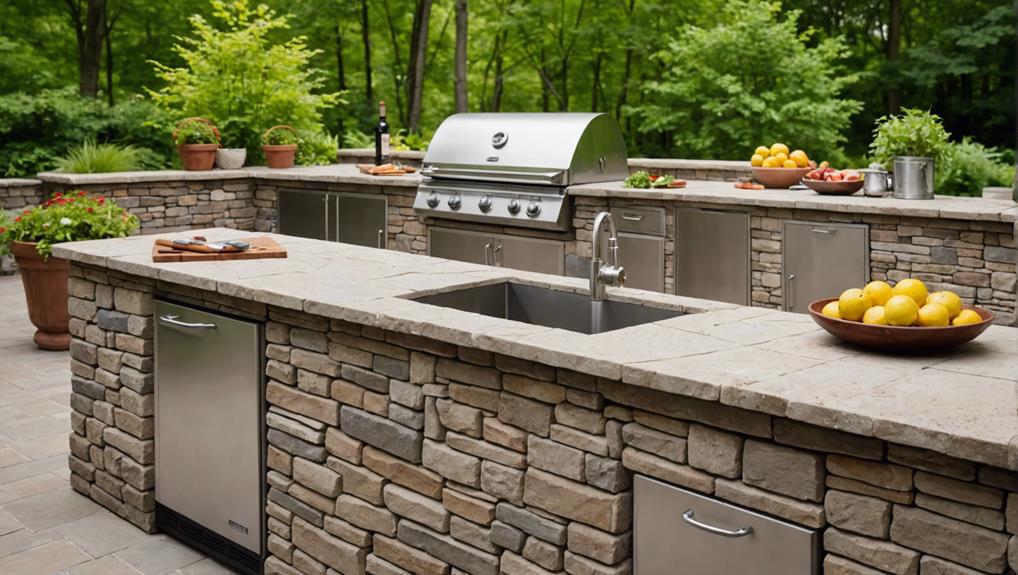
When planning your outdoor kitchen, it's crucial to balance the initial investment in materials like granite, concrete, or tile with their long-term maintenance costs. You'll want to ponder not only the upfront cost but also how these choices will impact your wallet down the line. It's wise to explore budget-friendly options that don't sacrifice durability or style.
Tile and concrete are excellent cost-effective materials. They offer a good balance between affordability and resilience, making them ideal for withstanding outdoor conditions without requiring frequent replacements or repairs. When comparing prices, don't just look at the tag on the material; factor in the installation costs as well. Some materials might seem cheaper at first glance but could be more expensive to install.
Also, take into account the long-term maintenance expenses associated with each type of countertop. For example, tile may need re-grouting over time, while concrete may require sealing to maintain its look and durability. Investing a bit more upfront in quality materials can ultimately be more economical, as it often reduces the need for costly repairs. Make sure you're making an informed decision that aligns with both your budget and your long-term financial considerations.
Aesthetic Choices in Countertops
You'll often find that choosing the right countertop can dramatically enhance the visual appeal of your outdoor kitchen. When focusing on aesthetic choices, consider how the materials you select can harmonize with your home's exterior and outdoor environment.
For a timeless look, natural stone like granite not only offers elegance but also withstands outdoor conditions, ensuring both color coordination and outdoor durability. If your taste leans towards a more modern, industrial vibe, concrete countertops are your go-to. These can be customized in various colors and finishes to match your style while maintaining the ruggedness required outdoors.
Tile countertops provide a versatile and cost-effective option. With a plethora of patterns and colors, they allow for creative design solutions that align with any decorative theme you envision. On the other hand, stainless steel countertops bring a sleek, minimalist aesthetic and are incredibly easy to maintain.
If you're leaning towards environmental sustainability without compromising on style, recycled glass countertops present an eclectic and vibrant choice. Below is a comparison to help guide your decision:
| Material | Aesthetic Appeal |
|---|---|
| Granite | Classic and elegant |
| Concrete | Modern and customizable |
| Tile | Colorful and versatile |
| Recycled Glass | Unique and sustainable |
Choose a material that reflects your style and meets the demands of outdoor durability.
The Role of Climate
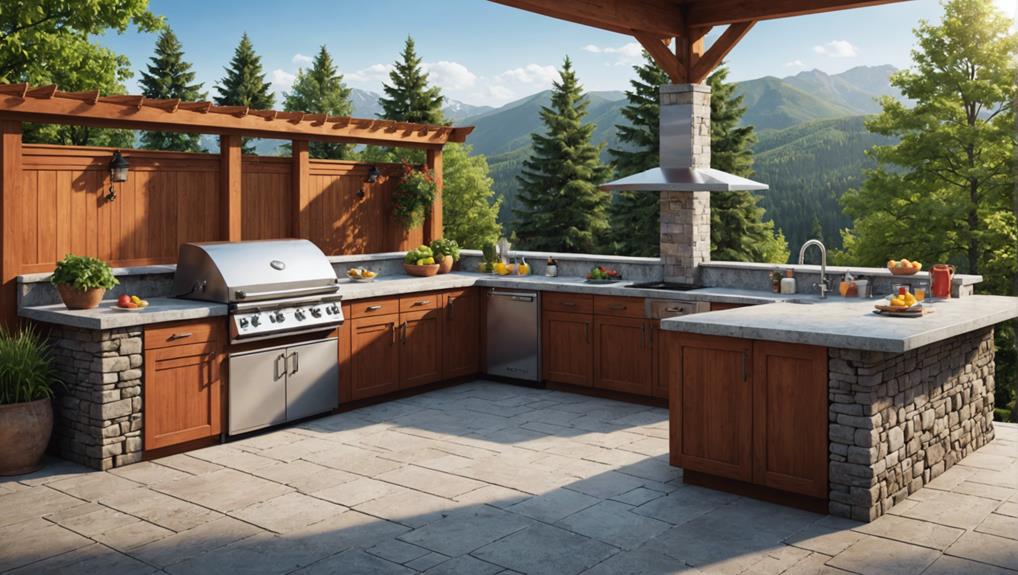
As you plan your outdoor kitchen, it's important to take into account how your local climate affects countertop materials. Weather resistance is vital; materials like granite and stainless steel can withstand temperature fluctuations and moisture better than others.
You'll want to select a countertop that not only matches your style but also holds up to the specific weather conditions in your area to make sure it lasts through the seasons.
Weather Resistance Importance
Understanding the role of climate in selecting your outdoor kitchen countertops is crucial, as various materials will perform differently under specific weather conditions. You'll want to choose materials that not only match your aesthetic but also withstand the local weather.
Here's what you should consider:
- Material Suitability: Assess which materials are best for your climate. Granite and quartzite are ideal for hot conditions.
- Outdoor Countertop Selection: Factor in the typical weather patterns of your area.
- Climate Impact: Understand how rain, snow, and UV exposure could affect different materials.
- Maintenance Needs: Consider how much maintenance each type of material will require under your specific weather conditions.
This approach ensures your outdoor countertops remain both functional and beautiful year-round.
Temperature Fluctuations Impact
Consider how temperature fluctuations might cause materials like concrete in your outdoor kitchen to expand and contract, potentially leading to cracks and other damage. To combat this, you'll want to choose materials renowned for their temperature resistance.
Granite, for instance, not only withstands severe temperature changes but also maintains its aesthetic appeal over time. It's important to incorporate regular outdoor maintenance to guarantee the longevity of your countertops.
Moisture and Humidity Effects
High humidity and moisture play significant roles in shaping the durability and appearance of your outdoor kitchen countertops. When choosing materials, consider how well they resist humidity to avoid frequent replacements and maintain aesthetic appeal. Here's a quick guide to help you:
- Granite: Highly resistant to moisture, doesn't absorb stains easily, and maintains its sleek look.
- Stainless Steel: Best for high humidity areas due to its non-porous nature and durability.
- Sealed Concrete: Make sure it's properly sealed to prevent moisture absorption and damage.
- Avoid Wood: Wood may warp or develop mildew in humid conditions.
Always prioritize material selection and humidity resistance to enhance the longevity and beauty of your outdoor space.
Placement and Installation Insights
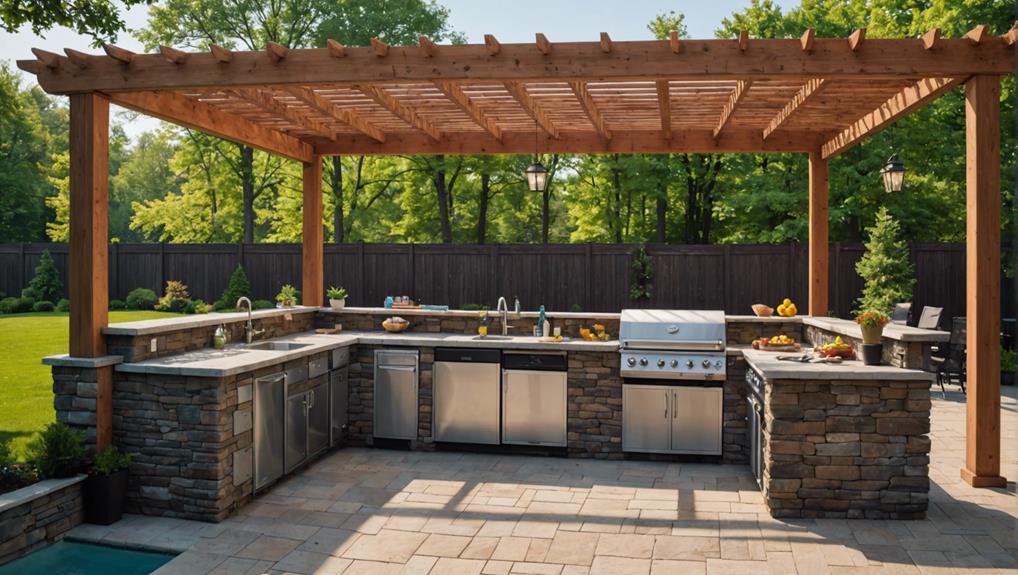
To maximize your outdoor kitchen's functionality and aesthetic appeal, strategically place countertops near essential features like grills and sinks. By doing so, you'll guarantee that food preparation is a breeze and that your space looks great. Consider integrating your countertops under a cover to shield them from weather extremes, thereby extending their life.
When selecting countertop materials, opt for options like granite, renowned for its durability and resistance to outdoor elements. Granite not only withstands the rigors of weather but also resists stains and scratches, which keeps your outdoor kitchen looking pristine. Make sure the style and color of your countertops harmonize with the overall design of your outdoor space. Current design trends lean towards natural, earthy tones that blend seamlessly with outdoor environments.
For installation, heed these tips: ensure that the base on which the countertops are installed is sturdy and level to avoid any future problems. Hiring a professional for installation might seem like an added expense but consider it an investment towards durability and functionality. Proper installation ensures that your countertops aren't only visually appealing but also structurally sound, enhancing the overall user experience in your outdoor kitchen.
Food Safety and Hygiene
When choosing countertops for your outdoor kitchen, prioritize non-porous materials like quartz or stainless steel that are simple to clean and maintain.
These surfaces won't absorb spills or harbor bacteria, ensuring your food prep area remains hygienic.
Regular cleaning and sanitization will be a breeze, keeping your outdoor cooking sessions both stylish and safe.
Easy Cleaning Surfaces
Consider choosing non-porous materials like quartz or stainless steel for their ease of cleaning and heightened food safety in your outdoor kitchen. These surfaces aren't only sleek and stylish but also champion cleaning efficiency and durability, making them perfect for both aesthetic appeal and practical use.
Here are four key benefits of selecting easy-to-clean materials:
- Stain Resistance: Materials like quartz resist stains, keeping the surface looking new.
- Hygiene Benefits: Non-porous surfaces prevent bacteria buildup, ensuring safer food preparation.
- Low Maintenance: Save time with surfaces that need minimal upkeep.
- Durability: Invest in countertops that withstand the elements and frequent use, ensuring long-term value and functionality.
Non-Porous Materials Selection
Building on the ease of maintenance, selecting non-porous materials like quartz and stainless steel also greatly enhances the hygiene and food safety of your outdoor kitchen. These surfaces are champions in surface sanitation and bacterial prevention, keeping your cooking space pristine and your food safe.
| Material | Benefit |
|---|---|
| Quartz | Resists stains, odors, and bacteria |
| Stainless Steel | Easy to clean, inhibits microbial growth |
Choosing these materials means you're not just opting for style; you're prioritizing health and safety. They don't absorb liquids or harbor harmful pathogens, ensuring a clean area for food prep every time. So, go ahead and create a space that's as safe as it is stunning.
Strength and Stability Analysis
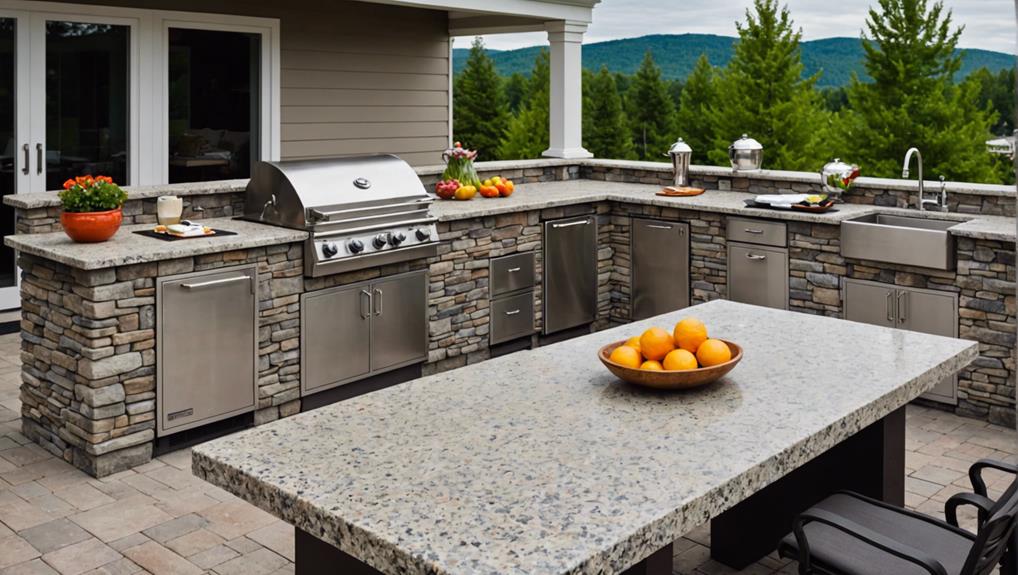
Evaluating the strength and stability of granite countertops showcases their unparalleled reliability for your outdoor kitchen needs. With granite's impressive durability, you're investing in both function and form, guaranteeing that your space isn't just beautiful but also enduring.
Here's why granite should top your list:
- Granite Longevity: It withstands the test of time. Granite's resilience makes it a top contender for enduring the harsh, variable conditions of outdoor environments.
- Outdoor Resilience: Granite thrives outside. Its non-porous nature means less weathering and minimal maintenance, no matter the climate.
- Heavy Use Adaptation: Whether you're hosting a large gathering or simply enjoying family meals, granite counters handle heavy use without showing wear.
- Heat Resistance: Place hot pots and pans directly on the surface without fear. Granite's high heat tolerance ensures no damage, making it perfect for lively cookouts.
When you choose granite, you're not just selecting a countertop; you're opting for a lifelong piece of your outdoor aesthetic. Its natural elegance complements any design while providing the robust functionality needed for outdoor cooking and entertainment. Remember, your outdoor kitchen deserves materials that match your lifestyle's intensity, and granite stands up to the challenge.
Popular Materials Overview
When selecting the best material for your outdoor kitchen countertops, it's important to weigh each option's durability, maintenance needs, and visual appeal. You're looking for a surface that stands up to weather, resists stains, and still looks fabulous.
Granite is famously durable and withstands outdoor elements brilliantly, making it a top contender for outdoor durability. However, quartz, while sleek and hygienic, may not be the best choice as it tends to discolor under the sun's harsh rays. This material comparison is significant as you'd want a countertop that maintains its color and texture throughout its outdoor life.
Concrete presents a rugged look and considerable strength, yet it's vulnerable to scratches and stains due to its porous nature. It requires regular sealing to maintain its appearance, adding to your maintenance checklist. Glass countertops, although modern and customizable, falter in outdoor settings due to their fragility and staining potential.
Each material has unique traits that could sway your decision. It's not just about picking the toughest material; it's about finding the right balance between functionality and aesthetics for your specific outdoor setting. So, consider these aspects to make sure you choose a countertop that not only looks stunning but also thrives outdoors.
Pros and Cons of Granite
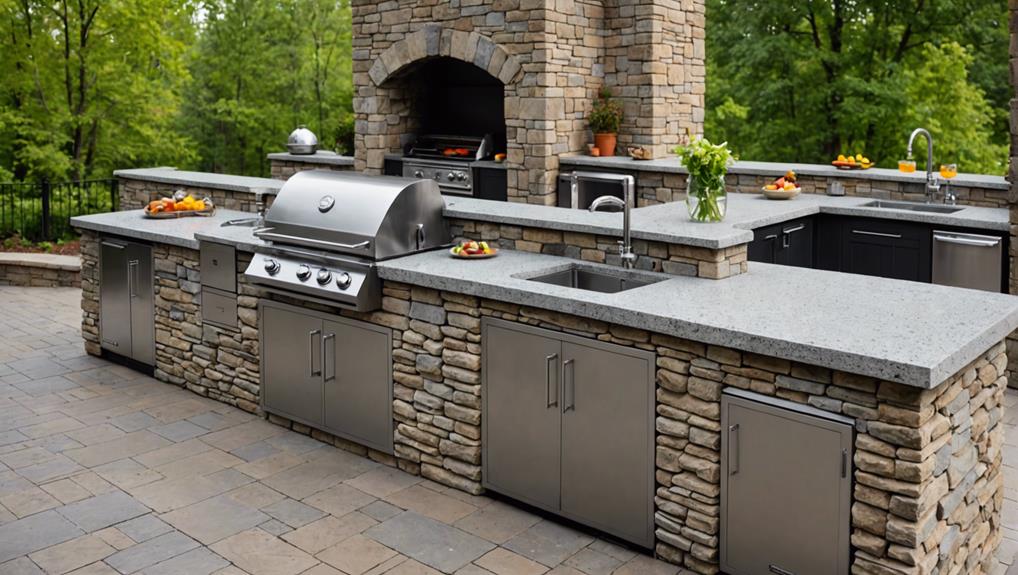
When you choose granite for your outdoor kitchen, you're investing in a surface that's built to last. Its non-porous nature means it's simple to maintain and resists stains from frequent spills and splatters.
However, you should be aware that while granite withstands the elements superbly, regular sealing is recommended to preserve its pristine appearance.
Granite Durability Factors
Considering its hardwearing nature, granite is an excellent choice for your outdoor kitchen countertops, combining durability with aesthetic appeal. Here's why you should consider granite for its longevity and resistance:
- Granite Longevity Features: Granite stands the test of time, maintaining its look and functionality even under tough weather conditions.
- Impact Resistance Characteristics: Its robust composition resists impacts, safeguarding against chips and cracks.
- Scratch Resistance: You won't have to worry about utensil marks or abrasions; granite keeps its pristine finish.
- Stain Resistance: Being non-porous, granite repels stains, making cleanup a breeze after those lively outdoor gatherings.
Opt for granite to make sure your outdoor space remains both functional and stylish for years to come.
Maintenance Requirements
To keep your granite countertops in peak condition, regular sealing is essential to enhance their stain resistance and durability. You'll need to manage the sealing frequency, typically once a year, to maintain their pristine appearance and functionality. Granite's non-porous nature makes it a breeze to clean, reducing the risk of bacterial growth and keeping your outdoor kitchen hygienic.
However, despite its robustness, granite isn't immune to damage. It boasts excellent heat and impact resistance, but heavy impacts can still lead to chipping or cracking. Treat your countertops carefully to avoid such issues.
With proper care, your granite surfaces will continue to add aesthetic value and practical utility to your outdoor kitchen for years to come.
Advantages of Concrete Options
Concrete countertops offer unmatched durability and versatility, making them an excellent choice for your outdoor kitchen. If you're considering materials that balance practicality with style, here's why concrete should top your list:
- Customization Options: You aren't limited to standard designs or shapes. Concrete can be poured and molded into any form you desire, enabling a perfect fit for your space and style preferences. This includes a variety of colors and textures, so you can tailor every detail to match your outdoor décor.
- Longevity Benefits: Concrete is incredibly durable. With regular sealing, it resists weathering, stains, and cracks, ensuring that it stands the test of time even in the toughest outdoor conditions. This makes it a smart investment for your outdoor cooking area.
- Cost-Effectiveness: Compared to high-end materials like granite or quartz, concrete is generally more affordable. This makes it a budget-friendly option that doesn't skimp on quality or aesthetic appeal.
- Stylish Finish: When maintained properly, concrete countertops develop a seamless and sophisticated look that enhances the overall appearance of your outdoor kitchen.
Choosing concrete gives you a robust, customizable, and stylish option that'll make your outdoor kitchen both unique and enduring.
Alternative Countertop Solutions
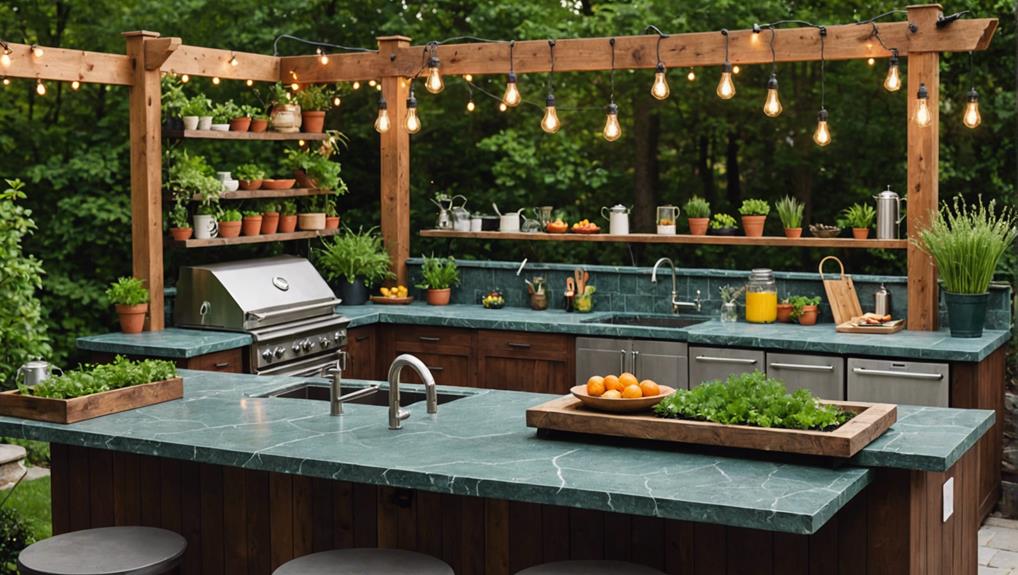
If you're exploring alternatives to traditional materials, consider recycled glass or porcelain countertops for their unique style and practical benefits in outdoor settings. Recycled glass isn't only a sustainable option, but it also brings a vibrant, artistic flair to your outdoor kitchen. Each piece is distinct, guaranteeing no two countertops are alike, which can perfectly echo the natural diversity of your garden or patio.
On the other hand, porcelain countertops are a budget-friendly alternative that maintains color integrity even under direct sunlight, making it ideal for sunny outdoor spaces. Its resistance to fading ensures a long-lasting fresh look without the high price tag associated with other materials.
While wooden worktops might offer a rustic charm, they demand regular maintenance and aren't as enduring as other materials. Concrete is another durable choice that can be customized and polished to match your aesthetic desires, also fitting well within a modest budget.
Avoid marble in outdoor kitchens, as it stains easily and offers limited options for hiding imperfections. Instead, focus on these innovative and practical solutions that guarantee durability, style, and cost-effectiveness, aligning with eco-conscious values and financial considerations.
Frequently Asked Questions
What Type of Countertop Is Best for an Outdoor Kitchen?
You're asking about the ideal countertop for outdoor cooking spaces. Prioritize weather resistance and low maintenance needs. Granite and quartzite excel in both, blending durability with aesthetic appeal for your culinary adventures outside.
What Is the Best Worktop for a Garden Kitchen?
For your garden kitchen, granite is the top choice. It's durable, weather-resistant, and maintains its appearance against the elements. Ideal for both utility and style, it guarantees a long-lasting, beautiful outdoor cooking space.
What Is the Cheapest Option for Outdoor Countertops?
For the cheapest outdoor countertops, consider tile. It's budget-friendly, costing $5 to $30 per square foot, and offers durability. Make sure it matches your aesthetic and meets your needs for material resilience.
How Thick Should Outdoor Kitchen Countertops Be?
For outdoor kitchen countertops, aim for 1.5 to 2 inches thick to guarantee material durability and withstand climate considerations. This thickness supports frequent use and enhances the aesthetic and functional quality of your space.
Conclusion
As you finalize your outdoor kitchen, consider how different countertops perform under the elements. Granite offers a stunning, durable choice, though it might stretch your budget.
Concrete is robust and versatile, often a more economical alternative. Don't overlook other materials that might suit your style and practical needs better.
Remember, the right countertop isn't just about looks; it's about enduring quality and ease of maintenance. Choose wisely to guarantee your outdoor space is as functional as it's beautiful.
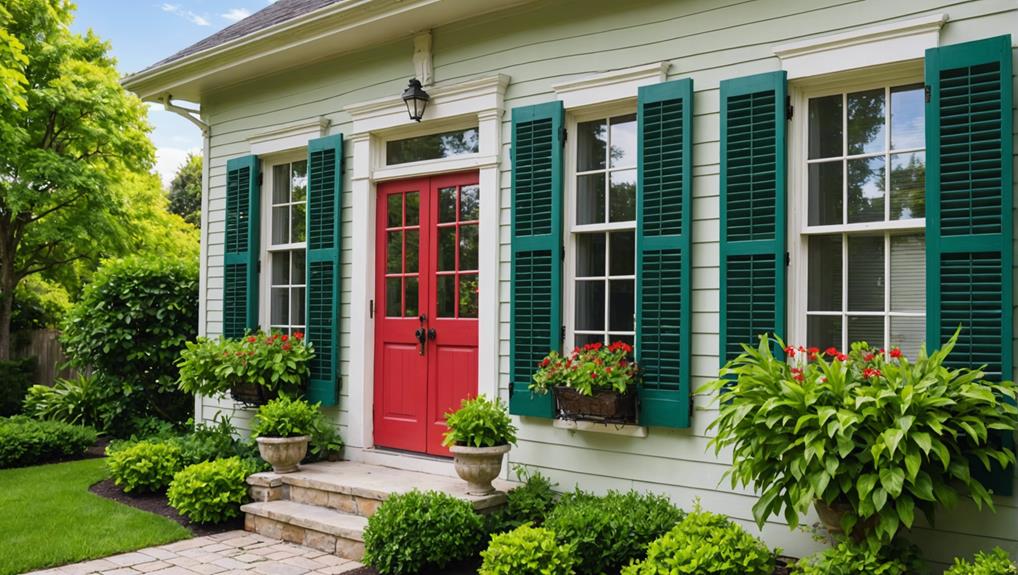
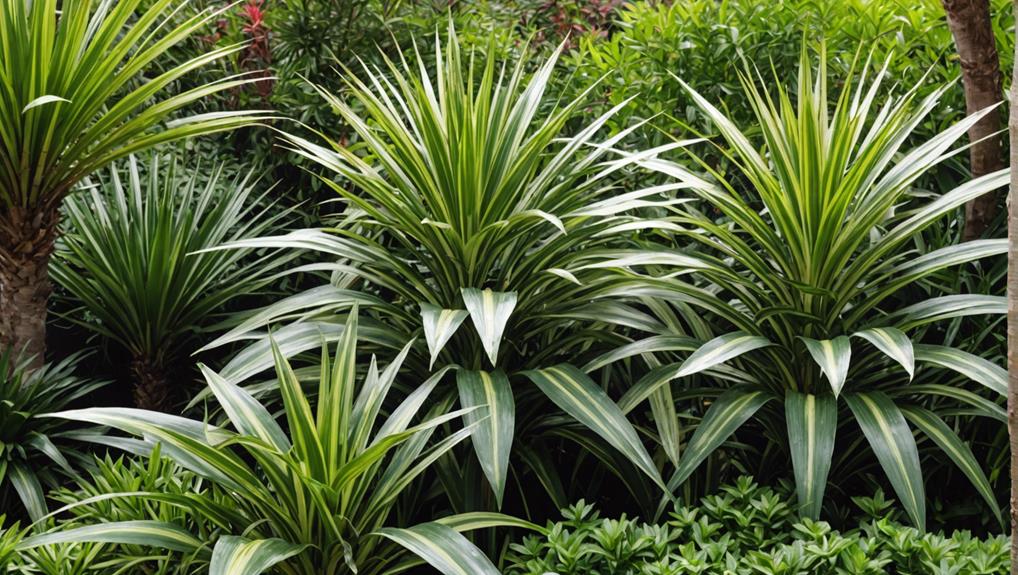
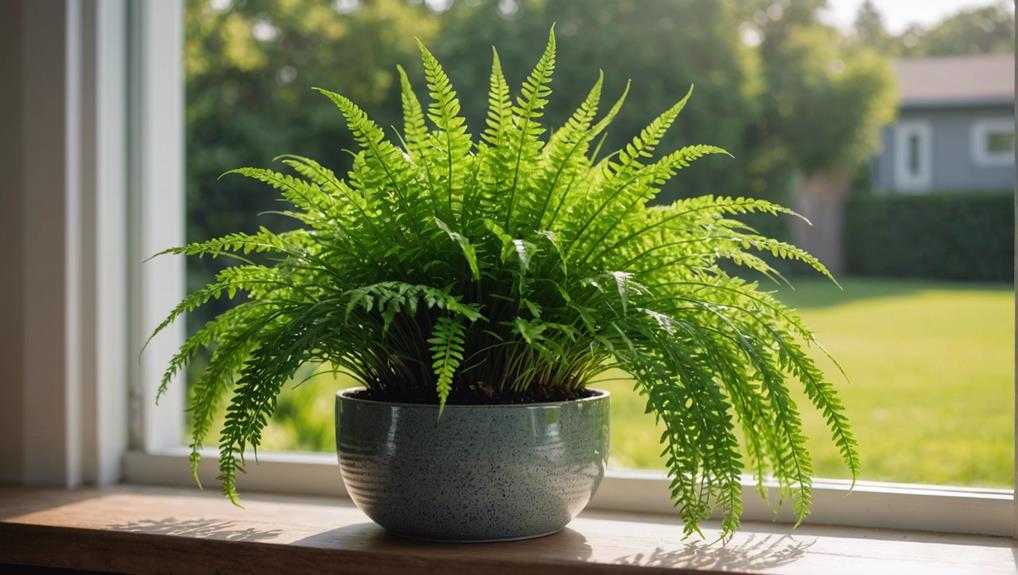
Leave a Reply